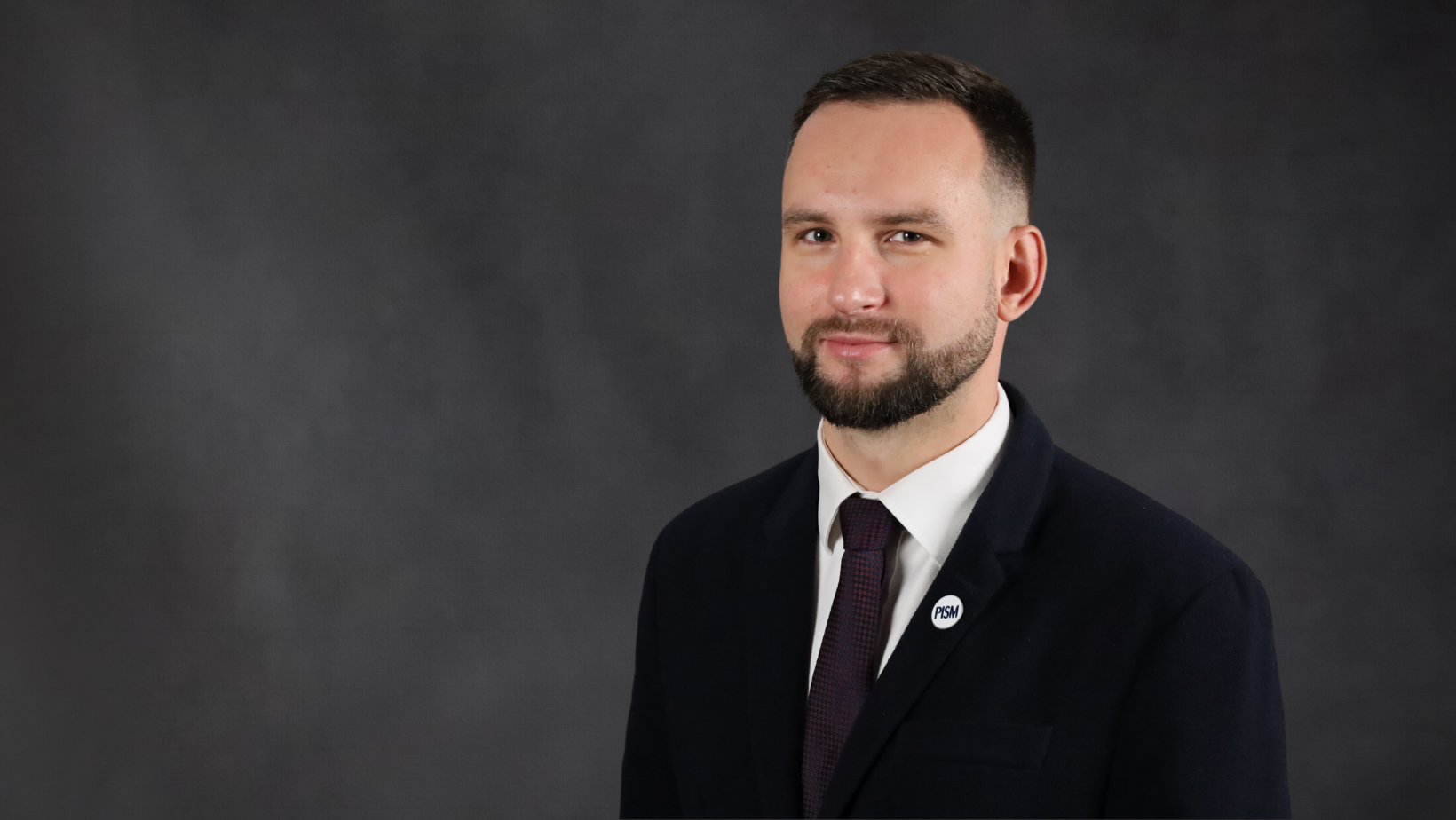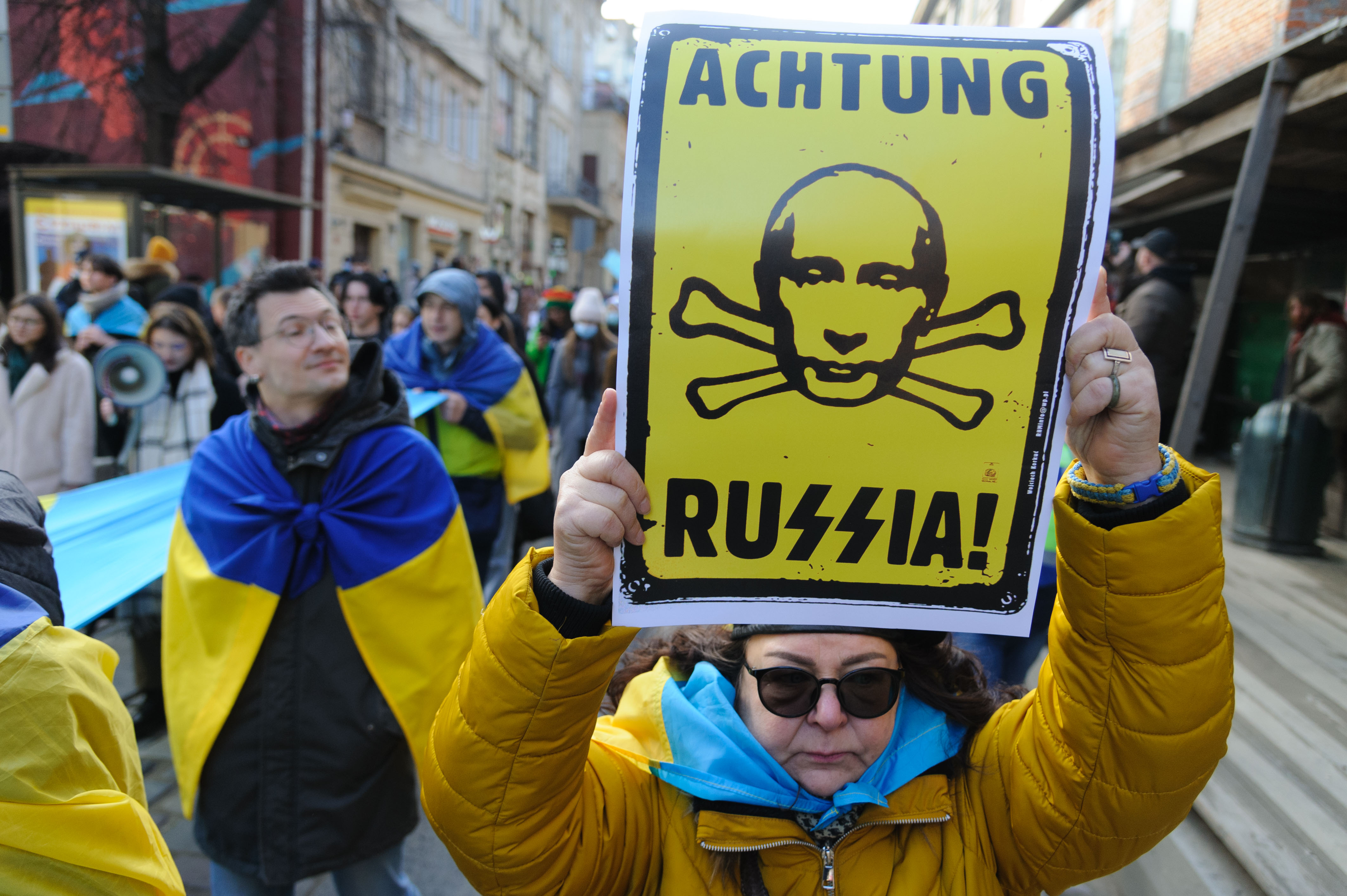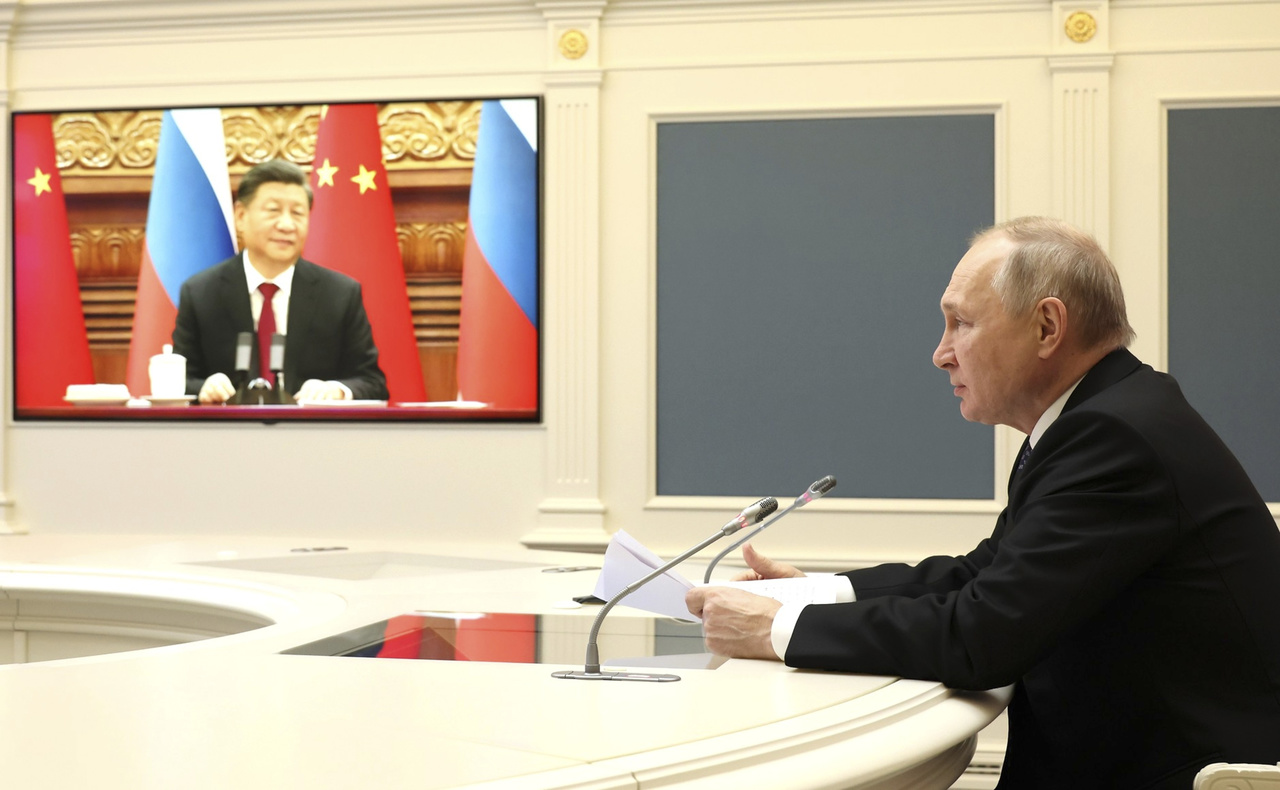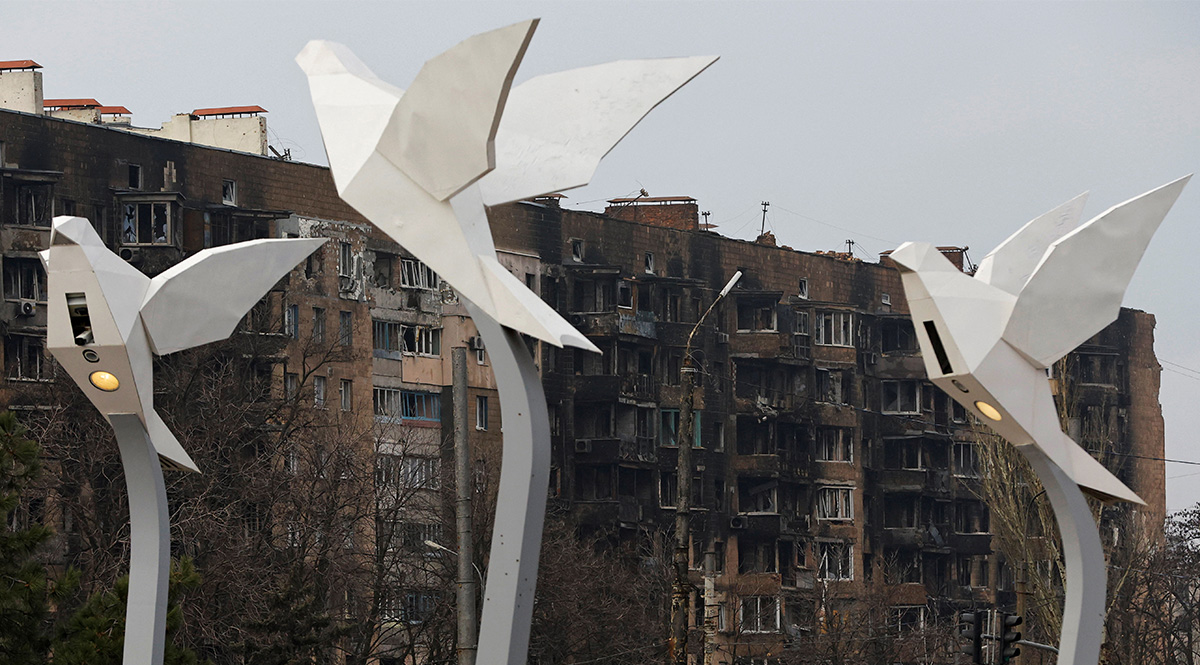Russia Intensifies Disinformation Offensive Against Ukraine
Russia is exploiting war fatigue in the West to undermine the rationality of support for Ukraine. It hopes to provoke divisions within NATO and EU states and consequently weaken military aid. Russian disinformation exploits the waning confidence in Ukraine’s victory, socioeconomic problems, and nuclear threats. EU and NATO institutions and member states should prepare for increased disinformation campaigns in the run-up to the European Parliament elections and the NATO summit in Washington.
 Milo Hess / Zuma Press / Forum
Milo Hess / Zuma Press / Forum
Two years after its full-scale invasion of Ukraine, Russia is regaining the initiative in the information sphere. The shock that the aggression against Ukraine caused in Europe initially weakened the effectiveness of Russian propaganda’s impact on Western societies, which were clearly in solidarity with Ukraine. By the time of the Ukrainian counter-offensive in summer 2023, Ukraine had conducted effective strategic communication and the Russian message was finding fertile ground mainly only among the countries of the Global South. Last year, the average support of EU societies for supporting Ukraine (in political, military, and humanitarian terms) was 74%, according to Eurobarometer. However, the lack of spectacular successes in the form of the recapture of occupied territories along the lines of Kharkiv or Kherson is causing a weakening of confidence in Ukraine’s victory, as well as in the legitimacy of continuing to provide it with military assistance. According to the latest ECFR research, on average, 10% of the public in EU countries believe in a Ukrainian victory, 20% are convinced that Russia will win, and 37% believe that the conflict must be ended through a bilateral agreement. The Russian disinformation apparatus uses this sentiment to undermine the rationality of decisions on further military supplies to Ukraine and to promote so-called peace propaganda.
Russian Disinformation Campaigns Against Ukraine
At the beginning of 2023, the Russian authorities created Special Influence Committees in the presidential administration to coordinate and evaluate the effectiveness of Russian information-psychological operations conducted by the intelligence services against Ukraine and the Western countries. This structure is headed by the deputy head of the presidential administration, Sergei Kiriyenko, who, together with a group of officials and experts (politechnologists), defines the strategic framework for campaigns against Ukraine. These narratives are aimed at: 1) discrediting the Ukrainian military and political leadership (e.g., by spreading corruption allegations); 2) creating divisions within the Ukrainian elite (e.g., by publicly fuelling disputes between President Volodymyr Zelensky and former Commander-in-Chief Gen. Valery Zaluzhny); 3) weakening the morale of the Ukrainian military (e.g., by exaggerating the losses on the Ukrainian side, the lack of state support for veterans and injured soldiers, or undermining the sense of continuing to fight,); and 4) confusing and weakening the morale of the Ukrainian population (by threatening a general mobilisation that allegedly includes minors, or undermining the credibility of support from Western partners). These narratives are mainly disseminated through so-called “troll farms”, special enterprises supervised by the intelligence services that produce more than 1,300 texts and 37,000 comments on Ukrainian social media per week. The promoted messages are then assessed in terms of coverage, which is one of the determinants in determining the next narrative lines.
Activities Targeting Western Countries
The Special Influence Committees are also intended to help Russia regain the initiative on the information warfare front against NATO and EU states. The intensity of Russian hybrid operations, of which propaganda is an element, was also temporarily weakened by the expulsion of more than 600 Russian diplomats (mostly intelligence officers) from EU states, as well as measures (e.g., sanctions) to disrupt the influence of Russian disinformation.
While EU sanctions have hindered Russia’s ability to reach false messages through official media, it still has the ability to do so through social media. At the beginning of this year. At the beginning of this year, Germany identified more than 50,000 inauthentic accounts managed by computer algorithms (bots) publishing thousands of messages a day containing themes consistent with the Russian message. In early March this year, Russia deliberately made public an intercepted conversation between German military officers about the potential transfer to Ukraine and the use of Taurus cruise missiles, which was used to undermine German public support for supporting Ukraine and cause divisions over this issue within the Alliance.
France has identified a network of more than 190 websites spreading Russian propaganda in France, Germany, and Poland. As part of what is known as Operation Doppelgänger, anti-Ukrainian content is spread via fake accounts impersonating other individuals and institutions. In order to increase the strength of their message, they are promoted by means of advertisements on social networks. The significant increase in the intensity of these activities correlates with the decision of Germany and France to increase military aid to Ukraine in November 2023.
According to the French authorities, Russia is conducting a long-term disinformation campaign to promote its interests and polarise French society. The main narratives include false claims suggesting that Western sanctions imposed on Russia are damaging the French economy, the provision of French armaments to Ukraine is weakening French defence capabilities, and the continuation of such policies will lead to World War III. Accusations of “financing a foreign war” are levelled by Russia against all countries providing military aid to Ukraine. Already in the first year of the conflict, Russia promoted, through its controlled media and bots, “anti-war movements” emerging in Europe, which, under the guise of calling for a “peaceful end to the war”, undermined the legitimacy of supplying the defending Ukraine with armaments and spread conspiracy theories suggesting the West’s desire for military confrontation against Russia.
In addition to the constant claims of Russian propaganda, such as the responsibility of the West for provoking the war in Ukraine, discrediting the image of Ukraine or historical animosities, Russia seeks to polarise Western societies by instrumentalising emerging socio-economic problems, such as the influx of refugees (an average of 23% of the public in EU states considers this a threat) or the issue of importing Ukrainian foodstuffs to EU markets, which has led to protests by farmers in Poland, Czechia, France, the Netherlands, and Germany.
Conclusions and Perspectives
The protracted war in Ukraine and the associated socio-economic consequences for NATO and EU states create favourable conditions for Russia to conduct disinformation operations. Russia is trying to bring about a delay or reduction in the supply of ammunition and armaments, which weakens Ukraine’s defence potential and increases the aggressor’s chances of expanding its territorial gains and, in the longer term, even forcing Ukraine to capitulate. In the information sphere, Russia maintains the threats of nuclear escalation of the conflict, formed since the beginning of the invasion, in order to deter decision-makers of some NATO and EU states from taking more decisive steps in supporting Ukraine. At the same time, Russian propaganda maintains that the conflict cannot be resolved by military means, in order to induce the West to seek the “peaceful” solution expected by Russia.
In view of the upcoming European Parliament elections, which are scheduled for 9 June, EU states should prepare for increased Russian information manipulation and interference aimed at supporting political circles (including radical ones) opposed to providing assistance to Ukraine. Russia may seek to achieve this goal by fuelling sentiment regarding problems related to the influx of Ukrainian foodstuffs, the issue of Ukrainian refugees, the costs associated with providing military aid to Ukraine or the West’s alleged desire for war with Russia.
In response, EU and NATO states should make greater use of the information-sharing mechanisms in force in both organisations (e.g., RAS, ISAC, Hybrid Fusion Cell, Hybrid Analysis Branch, Hybrid CoE), as well as develop cooperation formats in a smaller number of states (e.g., within the Weimar Triangle). A priority for Poland should be the creation of a specialised government agency dealing with the permanent detection of hostile disinformation campaigns using the DISARM-STIX methodology used by the EU structures. Standardisation of the way of detecting and analysing techniques, tactics and procedures (TTPs) used by hybrid actors will facilitate Poland’s exchange of information with other Member States and specialised EU structures.





